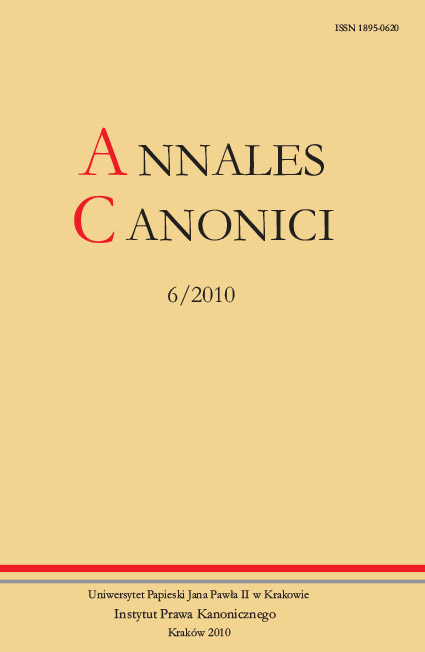Application of the Holy Mass fruits
DOI:
https://doi.org/10.15633/ac.0610Abstract
The application of the Mass presupposes the doctrine of the Catholic theology about the various fruits of the Mass. Three kinds of fruits or effects are usually recognized: the holy sacrifice benefits the entire Church (a general fruit – generalis, comunis, universalis); it benefits the celebrating priest himself (a very special fruit – specialissimus); the Mass may be applied to the specific intentions of the celebrant (a special fruit – ministerialis, medius, specialis). The application must be “objectively determined” and it must be made before the consecration. According to the Code of canon law from 1983, the Mass may be applied for anybody. That norm is considerably different from its correlate in the 1917 code which said that Mass may be applied for the in purgatory or for the living with the exception of public Masses for the excommunicated. Private Masses could be applied for tolerated excommunicates, which included baptized non-Catholics, but for excommunicates who must be avoided, a private Mass could be applied only for their conversion. Today the limitations refer to situations in which the application of the Mass constitutes a public (know) event. A funeral Mass may not be celebrated for those who have been excluded from ecclesiastical funerals in can. 1185 CIC.
Downloads
Published
Issue
Section
License
Copyright (c) 2010 Tomasz Jakubiak

This work is licensed under a Creative Commons Attribution 4.0 International License.
The author declares that he owns the copyright to the work (article) and that it is not limited in the scope covered by the above declaration and that the work (article) is an original work and does not infringe the copyright of other persons.
The author allows the Pontifical University of John Paul II in Krakow to use the paper free of charge, non-exclusive and unlimited in time by, i.e.:
– keeping in records and reproduction of the copies of the work using printing, reprography, magnetic recording and digital technology;
– trade in the original or copies on which the work has been recorded (introduction to the market, lending or rental of the original or copies, public exhibition, display, as well as making the work available to the public in such a way that everyone can have access to it in a place and at a time chosen by them);
– inclusion of the work in a collective work;
– granting by the Pontifical University of John Paul II in Krakow a Creative Commons Sub-licence Authorship Recognition-Non-commercial Use-No Subsidiaries 3.0 Poland
The Pontifical University of John Paul II in Krakow makes the work available on the Magazine Platform of the university under the Creative Commons Attribution-Non-commercial Use-No Subsidiary Works 3.0 Poland license.
Thus, it entitles all interested parties to use the work under the following conditions:
- the author and the title of the work will be given,
- the place of publication (journal title and internet address of the originally published work) will be indicated,
- the work will be distributed in a non-commercial manner,
- no dependent works will be created.

